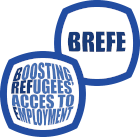Boosting refugees' access to employment
Boosting refugees' access to employment is an Erasmus+ strategic partnership supported by the European commission.
Our objectives are :
- to improve the learning experience of refugees and newcomers and to empower them regarding learning.
- to facilitate a quicker access to employment by transferring part of the language learning inside the company.
- to valorise key competences and transversal skills for obtaining a first job.
- to associate companies in the learning and in the global integration process.
Why ?
- Because the access of refugees to employment is delayed compared to other disadvantaged groups: depending on the countries, they may need more than six years to catch up with the whole population. The situation is particularly difficult for women.
- Refugees and newcomers who are fluent in the language of the host country have more facilities (refugees in the EU who speak the local language at beginner level or less have an employment rate of only 27%, this more than doubles to 59% for those with intermediate language skills).
- Immigrants need and want to work and their access to employment could be improved if a good knowledge of the host country language was not set as an absolute pre-requisite. Language learning can also take place on the job with the support of employers in search of workers. Experiences have shown that it is also a more effective.
Partners involved
- Ceipiemonte (IT) - www.centroestero.org
- Foreningen Nydansker (DK) - www.foreningen-nydansker.dk
- Greta du Velay (FR) - www.velay.greta.fr
- Solidaridad sin fronteras (ES) - www.ssf.org.es
Toolbox
1) Tool-kit for language teachers, trainers, social workers and volunteers:
- to adapt their intervention respecting personal history of refugees and newcomers.
- to take into account migration path and pre-migratory experience.
- to integrate expectations and priorities of refugees and newcomers regarding integration in the host country.
- to integrate the learning experience and the learning practices of immigrants, in particular regarding the acquisition of languages
- to identify and develop the already existing key competence “learning to learn”.
- to help migrants designing their own personal learning environment in particular to manage language learning outside a formal centre, at home or at work.
2) Method and tools to identify and develop the skills of refugees-newcomers with a perspective of employment in the host country.
- take into account the migration experience to valorise it by detecting and highlighting the underlying skills.
- identify skills that are able to be used to work.
- develop key competences and transversal skills of refugees and newcomers in a perspective of access to employment.
3) Method and tools to prepare and support companies to employ refugees and newcomers:
- to raise awareness about the existing transversal competences and key skills and that are useful for work, so that migrants can be employed even with a language level equal of less than A1.
- to prepare the reception of the refugee-newcomer (awareness of staff and co-workers, adaptation of tasks and workstation).
- to support and accompany a new employee with a low language level (preparation of mentors so that they are able to support them, encourage and guide language learning on the job, actions to facilitate a global participation to the host society...)
Legals
This website is manager by the Brefe project partnership. It is hosted on Greta du Velay's webserver (contact).
The European Commission's support for the production of this web site does not constitute an endorsement of the contents, which reflect the views only of the authors, and the Commission cannot be held responsible for any use which may be made of the information contained therein.
